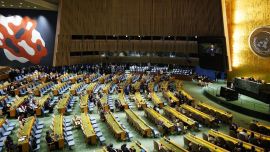Argentina voted on Wednesday at the United Nations (UN) General Assembly in favour of the embargo that the United States has maintained on Cuba since 1960.
The decision by President Javier Milei’s government represents a significant change in foreign policy. The decision formally ends more than three decades of consistent votes by Argentina in support of the annual resolution calling for an end to the US embargo on the Caribbean nation.
For 33 consecutive years, the United Nations has urged Washington to lift the restrictions, which have been condemned by most governments and humanitarian organisations as a violation of international law and a source of economic hardship for the Cuban population.
The non-binding resolution, which has been passed each year since 1992, calls for "ending the economic, commercial and financial embargo imposed by the United States of America against Cuba."
A total of 165 countries voted in favour of the resolution to lift the embargo, while it was rejected by the United States, Israel, Hungary, Ukraine, Paraguay, North Macedonia and, for the first time, Argentina.
Several nations – notably Poland, the Czech Republic, Estonia, Latvia and Lithuania – abstained from Wednesday's vote over Cuba's support for Russia in its war with Ukraine.
Washington's envoy to the UN, Mike Walz, strongly opposed the text.
"Please stop repeating this propaganda that allows the regime to then go back and have an excuse for its own failures," the ambassador said in a debate Tuesday.
Hitting back, Cuba's Foreign Minister Bruno Rodríguez labelled Walz's remarks "threatening, arrogant, deceitful and cynical."
He called on the US to at least suspend or make humanitarian exceptions to the embargo due to the impact of Hurricane Melissa, which this week tore through Cuba and neighboring countries.
Argentina’s change in position follows earlier controversy under former foreign minister Diana Mondino, who was sacked by Milei last year after Argentina retained its historic position in the annual UN vote.
When Argentina voted in line with its historic stance, Milei released a statement stating that the nation "categorically opposes the Cuban dictatorship and will remain firm in promoting a foreign policy that condemns all regimes that perpetuate the violation of human rights and individual freedoms."
Early in Milei’s tenure, the government had already hinted at a review of its traditional stance on Cuba and Venezuela, arguing that Argentina should “defend democracy consistently” and “avoid ideological alignments.”
Those comments drew protests from regional allies and Cuban officials, who accused Buenos Aires of abandoning its historical non-interventionist diplomacy.
Since taking office in December 2023, Milei has reorientated Argentina’s foreign policy in line with the United States and Israel, the nations he describes as his “pillars.”
– TIMES/NA/AFP

























Comments